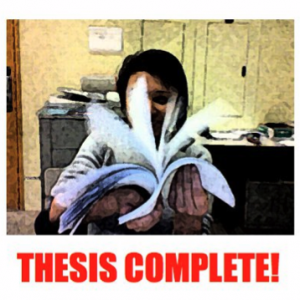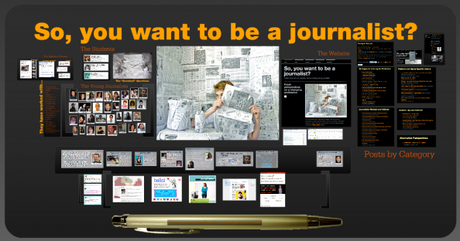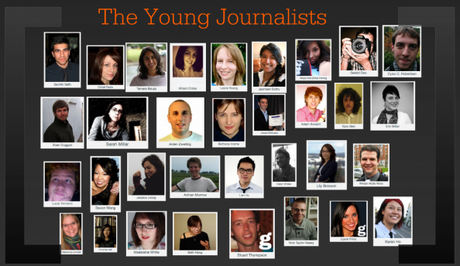
If you follow this blog, you know I’ve been neck-deep in another website (So, you want to be a journalist?) for several months. Short explanation: the site somehow became my thesis project.
I’m now finished with grad school — wow, it feels so good to write that! — but I’m still recovering from it.
My thesis hangover is not really the result of putting the site together, which wasn’t too bad. It has more to do with writing a 60-page literature review that grounds the blog’s anecdotal advice in relevant academic texts.
Without getting into the details, heres’ the breadth of what I researched and wrote about:
- the current media landscape
- the changing definition of journalism
- the role of journalism education in adapting to 21st century needs
- the professional norms, ethics and standards that guide journalists in their day-to-day practice
- the relationship between journalism and democracy/the public sphere (ideals and critiques)
- the role of technology (historical precedents/convergence)
- the rise of participatory journalism
- the reconfiguration of economic models.
Yep — that’s why I started calling my literature review “the beast.” Thing is, in order to appreciate the plethora of the changes young journalists are seeing in this field, it’s important to dabble in all of the above.
Now, I’m proud to say I’ve completed the project, presented the site my peers, and had plenty of great naps since flying back to Toronto. The word “thesis” no longer triggers heart palpitations and nausea.
So, I guess this means I’m finally ready to introduce the project a little more thoroughly, and then promise to start blogging about, you know, other things.
Here goes!

Screen shot of my "prezi" (interactive presentation) that walks through the main features of the site
1) What is the website, and why’d you do this to yourself?
“I can say that I have never seen a truly gifted young journalist go unrecognized. Maybe in the short run, but never over time. There just isn’t that much excellence loose in the world that news executives can afford to ignore it.”
- Samuel G. Freedman, Letters to a Young Journalist (2006, p. 149)
“So, you want to be a journalist?” is an anthology of original advice by young journalists, for young journalists. It includes 34 blog entries that range from general guidance to platform and genre-specific pointers. The site also includes a multi-platform resource section for those interested in further reading, listening, and viewing.
The project was inspired by my experiences as a teaching assistant for the UBC School of Journalism’s undergraduate new media course. Many of the students are considering a career in journalism, and have expressed interest in hearing practical advice from those at the entry level of the profession.
In response, I created the website and (insert elaborate explanation here) it ended up becoming my thesis project.
2) How did you chose the young journalists?
Full disclosure: I did not use a quantitative metric to gauge the potential of the participants.
We are a generation that is making its way forward during a time of immense transition in both the industry and society at large, and measuring potential is not a precise science. Still, I want to be transparent about this very important question.
Of the 34 young journalists featured on the site, nine were selected by me for their specialty knowledge, 24 were recommended to me by their peers, and one approached me with his qualifications after having come across the site. I have met 17 of the 32 contributors in person. They are 15 men and 19 women of various ethnic and socio-economic backgrounds, and all have some form of post-secondary education.

Missing from this mural: Gerald Deo and Alexandra Posadzki (most recent contributors)
Each one of these incredible young people have all demonstrated passion and proficiency, but all have done so in different ways.
Some have earned prestigious accolades early in their careers. Ex: Allison Cross and Leslie Young were part of the first team of (Canadian) students to win an Emmy award, and Jasmeet Sidhu has already been named one of Canada’s 100 most powerful women by the Globe and Mail.
Others stand out for their specialized talents in particular areas. Ex: Alejandra Hering has advanced experience in creating online portfolios, and Adam Avrashi has hosted his own morning radio show.
Still others have demonstrated incredible ambition on the ground. Ex: Jesse McLean, while still an intern at the Toronto Star, reported from Haiti after the 2009 earthquake. During Toronto’s recent G20 summit, Bethany Horne broke news that police had been granted extra powers .
Basically, my compilation is more qualitative than it is standardized, and is by no means an exhaustive list of everyone with potential. Off the top of my head, I can name several promising young reporters that I don’t have on my site. Ex: Jodie Martinson, Daniel Dale, Sunny Dhillon, Jennifer Yang, and Anna Mehler-Paperny.
3) What did you learn about your peers?
It has been eye opening to read the perspectives of my peers – many of whom recast uncertainty as opportunity. As Samuel G. Freedman notes, “If you care about journalism and you care about excellence, you cannot help but feel despair when it or you don’t measure up”.
Without the promises of fame, fortune, or even relative stability, these young talents are choosing journalism in an unpredictable time. Many are producing quality public service journalism, and rising above the expectations of the so-called “tuned out” generation. They are showing up with their sleeves rolled up, and are ready to lay the foundations of 21st century journalism.
Mark Deuze neatly summarizes the situation they now face: “The biggest challenge worldwide seems to be to find ways to educate and train tomorrow’s media professionals based on the need to retain, reconnect with, join hands with a fragmented, disengaged, and increasingly critical public in the context of contemporary democracy” (2009, p. 141).
This is our task as young journalists, and we should not take it lightly. Our generation is coming up through the system, and we have the historic opportunity to change it from within.
I’ve been inspired by the caliber of those who are embracing this challenge.
4) Okay, so what did they write about?
There are many ways to navigate the site (scrolling down and reading in reverse chronology, sorting by author, sorting by title) but I think the following categories break it down best:
Journalistic Mindset and Attitude
- Filter everything for yourself, including this advice
Advice from William Wolfe-Wylie - To write interesting work, you have to be interested.
Advice from Leslie Young - You have to love it
Advice from Lauren Pelley - Come to grips with the worst case scenario
Advice from Arden Zwelling - When you think you’ve worked hard enough, work harder.
Advice from Lucas Timmons - Get inspired. Respect your audience. Think ahead.
Advice from Bethany Horne - Don’t do it for fame or fortune
Advice from Liem Vu - Focus on your own journey
Advice from Evan Duggan - Pay close attention to your world
Advice from Chloé Fedio - Be flexible
Advice from Allison Cross
Strategies for Entering the Profession
- Stand out. Go global!
Advice from Jasmeet Sidhu - J-school isn’t the only option
Advice from Tamara Baluja - Live an interesting life
Advice from Jessica Linzey - Constantly update your skills, and never stop writing
Advice from Nick Taylor-Vaisey - Cross-platform ‘clippings’ are key!
Advice from Erin Millar - Take every opportunity (even those that aren’t paid!)
Advice from Devon Wong - Be relentless and build yourself a name and a niche
Advice from Amanda Ash - Don’t wait until you’ve graduated
Advice from Jesse McLean - See if you enjoy writing for an audience
Advice from Beth Hong - Just do it
Advice from Rebecca Lindell - Get outside the classroom
Advice from Adrian Morrow
Specific Tips and Pointers
- Ten things you can do right away
Advice from Dylan C. Robertson - Pitch it so they can’t ditch it
Advice from Madeleine White - On student papers, digital footprints, and the art of networking
Advice from Sarah Millar - Be part of the student press, and get on twitter
Advice from Stuart Thompson - Learn by doing and learn to pitch
Advice from Kate Allen - Three tips for landing a great internship in journalism
Advice from Alexandra Posadzki
Platform and Genre Specific Advice
- The interview begins online. How do you introduce yourself? [Building an online portfolio]
Advice from Alejandra (Alex) Hering - Radio journalism for rookies
Advice from Adam Avrashi - News is what people want to keep hidden. Everything else is publicity. [Investigative journalism]
Advice from Calyn Shaw - Come to grips with the worst case scenario [Sports Journalism]
Advice from Arden Zwelling - When disaster hits home [Covering natural disasters]
Advice from Lily Boisson - Behind the scenes with TV personalities [Working with TV correspondents and anchors] Advice from Sachin Seth
- Choose the camera that fits your hands. Make interesting mistakes.
Advice from Gerald Deo
Alternative Perspectives
- A view from inside the PR industry
Advice from Karen Ho
